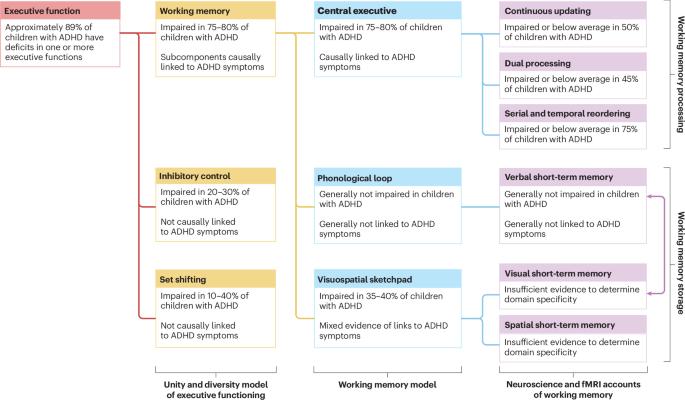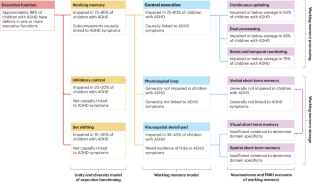Executive function deficits in attention-deficit/hyperactivity disorder and autism spectrum disorder
IF 16.8
Q1 PSYCHOLOGY, MULTIDISCIPLINARY
引用次数: 0
Abstract
Executive function deficits have been reported in both autism spectrum disorder (ASD) and attention-deficit/hyperactivity disorder (ADHD). However, little is known regarding which, if any, of these impairments are shared in children with ADHD and those with ASD. In this Review, we provide an overview of the current literature with a critical eye toward diagnostic, measurement and third-variable considerations that should be leveraged to provide more definitive answers. We conclude that the field’s understanding of executive function profiles in ASD and ADHD is highly limited because most research on each of these disorders has failed to account for the possible co-occurrence and the presence of symptoms of the other disorder. A vast majority of studies have relied on traditional neuropsychological tests and informant-rated executive function scales that have poor specificity and construct validity, and most studies have been unable to account for the well-documented between-person heterogeneity within and across disorders. At present, the most parsimonious conclusion is that children with ADHD and/or ASD tend to perform moderately worse than neurotypical children on a broad range of neuropsychological tests. However, the extent to which these difficulties are unique to one of these disorders or shared, or are attributable to impairments in specific executive functions, remains largely unknown. We end with focused recommendations for future research. Children with attention-deficit/hyperactivity disorder and/or autism spectrum disorder show executive function deficits compared to neurotypical peers. In this Review, Kofler et al. question the evidence to examine whether these deficits are shared across both conditions and provide recommendations for future work.


注意缺陷/多动障碍和自闭症谱系障碍的执行功能缺陷
据报道,自闭症谱系障碍(ASD)和注意力缺陷/多动障碍(ADHD)都存在执行功能缺陷。然而,对于注意力缺陷/多动障碍儿童和自闭症谱系障碍儿童是否存在共同的执行功能缺陷,我们却知之甚少。在这篇综述中,我们概述了目前的文献,并对诊断、测量和第三变量方面的考虑因素进行了批判性的审视,这些因素应被用来提供更明确的答案。我们的结论是,该领域对 ASD 和 ADHD 的执行功能特征的了解非常有限,因为对这两种障碍的研究大多没有考虑到可能同时存在的另一种障碍的症状。绝大多数研究都依赖于特异性和建构效度较差的传统神经心理学测试和信息评定的执行功能量表,而且大多数研究都无法解释有据可查的障碍内部和障碍之间的人际异质性。目前,最合理的结论是,多动症和/或自闭症儿童在各种神经心理学测试中的表现往往比神经正常儿童差一些。然而,这些困难在多大程度上是其中一种障碍所独有的,或者是共同存在的,或者是由于特定执行功能的损伤所造成的,这在很大程度上仍然是未知数。最后,我们对未来的研究提出了重点建议。
本文章由计算机程序翻译,如有差异,请以英文原文为准。
求助全文
约1分钟内获得全文
求助全文

 求助内容:
求助内容: 应助结果提醒方式:
应助结果提醒方式:


